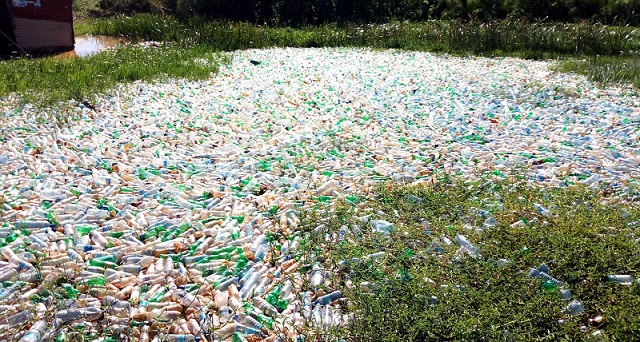
While the current debate about plastics often centers on reducing consumption, this narrow focus overlooks the urgent need to curb fossil-fuel-based plastic production
COMMENT | JAYATI GHOSH | There is no denying that plastics have delivered tremendous benefits over the past century, driving technological innovation, transforming health care, and fueling global economic growth. But as we now know, this progress has come at great cost.
The adverse consequences of our overreliance on plastics are well-documented. From the extraction and transport of the fossil fuels required to produce them, through the manufacturing process, to their everyday use and disposal, each stage of plastics’ life cycle implies pollution and environmental degradation.
Plastic pollution endangers wildlife, damages ecosystems, and poses serious risks to human health. Microplastics, along with the toxic chemicals they contain, are found in the air we breathe, the food we eat, and can be absorbed through the skin. As plastic waste accumulates in oceans, rivers, and lakes, harmful chemicals contaminate the soil, disrupting plant life. While the full implications of nanoplastics for human health remain under-researched, it is clear that vulnerable groups – children, women, impoverished communities, and workers in plastic production, waste management, and recycling – bear the brunt of these hazards.
The current debate, particularly concerning single-use plastics, often centers on disposal, prompting calls for “circular economy” solutions like recycling. But there are no truly “safe plastics,” and product labels claiming otherwise are misleading and obscure the damage caused by oil and gas extraction, which accounts for 99% of the world’s plastic. The toxins released during fossil-fuel extraction are known to harm the skin, eyes, and the respiratory, nervous, and gastrointestinal systems, as well as the liver and brain.
Plastic production is not only a direct threat to human health but also a major driver of climate change, accounting for roughly 3-8% of global greenhouse-gas (GHG) emissions. Yet, despite the existential dangers posed by the climate crisis, plastic production continues to surge. OECD estimates suggest that, if current trends persist, global plastic use – and the waste it generates – could nearly triple by 2060. Half of this waste is expected to end up in landfills, with less than 20% being recycled.
Even more alarmingly, recycled plastics are projected to account for just 12% of all plastic use in 2060, while plastic leakage to the environment is set to double, reaching 44 million tons annually, with devastating consequences for human health and natural ecosystems. If the industry’s expansion plans are realized, plastic production could consume 31% of the planet’s remaining carbon budget for limiting global warming to 1.5° Celsius.
This manufacturing surge is increasingly misaligned with projections of future demand. One study suggests that the global production of plastics like polypropylene may need to decrease by 18 million tons annually by 2030, owing to reduced demand from China and other countries. In fact, petrochemical companies are already grappling with a global glut – yet another example of market forces failing to deliver efficient or even sensible outcomes.
Petrochemical companies investments going wrong direction
With corporations under growing pressure to reduce GHG emissions, doubling down on fossil-fuel-based plastic production seems not just reckless but also economically shortsighted. Still, a recent study by the Institute for Energy Economics and Financial Analysis found that even in the face of potential credit downgrades, the world’s largest petrochemical companies are “making major investments going in the wrong direction.”
Given the stakes involved, it is clear that reducing plastic consumption alone will not be enough to protect human health, the environment, and the planet. As the Intergovernmental Negotiating Committee on Plastic Pollution approaches its final meeting in Busan later this year, ongoing efforts to conclude a global treaty to end plastic pollution must confront the urgent need to curb production.
Regrettably, as with many international negotiations, resistance from powerful vested interests may block essential measures from making it into the final agreement. The Committee’s April meeting in Ottawa was a case in point, revealing deep divisions over key strategies. The most contentious issue was the proposal to cap global plastic production, which faced fierce opposition from plastic manufacturers, their host countries, and oil and gas producers. These interest groups favored a narrower approach, focused on recycling. Some petrostates even argued that the treaty should cover only waste management.
To be sure, recycling is essential. But it cannot deliver the necessary reductions in plastic production and consumption, nor can it address the effects of plastic pollution on human health. Even in the best-case scenario, without broader measures to control production, pollution will continue to surge, causing severe health crises, exacerbating environmental degradation, and accelerating global warming.
Unsurprisingly, industry lobbies are pushing for a non-binding international plastic treaty without a clear legal mandate and enforceable commitments. Such treaties are bound to become little more than vague promises and quickly fade into irrelevance.
Curbing plastic use and production is crucial to facilitating the behavioral changes needed for humanity to adapt to new ecological realities. If industry lobbies succeed in weakening the plastics treaty by excluding production limits or making its provisions non-binding, they will undermine efforts to combat climate change.
As the climate crisis worsens, reducing plastic pollution has never been more urgent, which is why negotiations for a global treaty have gained so much momentum. But the negotiations deserve far more public attention and engagement. To ensure a more sustainable future, we should be pressuring our governments to commit to a binding international agreement that would limit and ultimately reduce plastic production and use.
****

Jayati Ghosh, Professor of Economics at the University of Massachusetts Amherst, is a member of the Club of Rome’s Transformational Economics Commission and Co-Chair of the Independent Commission for the Reform of International Corporate Taxation.
www.project-syndicate.org
 The Independent Uganda: You get the Truth we Pay the Price
The Independent Uganda: You get the Truth we Pay the Price



